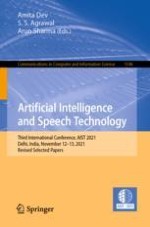2022 | OriginalPaper | Buchkapitel
A Comparative Study on a Disease Prediction System Using Machine Learning Algorithms
verfasst von : S. Rama Sree, A. Vanathi, Ravi Kishore Veluri, S. N. S. V. S. C. Ramesh
Erschienen in: Artificial Intelligence and Speech Technology
Aktivieren Sie unsere intelligente Suche, um passende Fachinhalte oder Patente zu finden.
Wählen Sie Textabschnitte aus um mit Künstlicher Intelligenz passenden Patente zu finden. powered by
Markieren Sie Textabschnitte, um KI-gestützt weitere passende Inhalte zu finden. powered by
